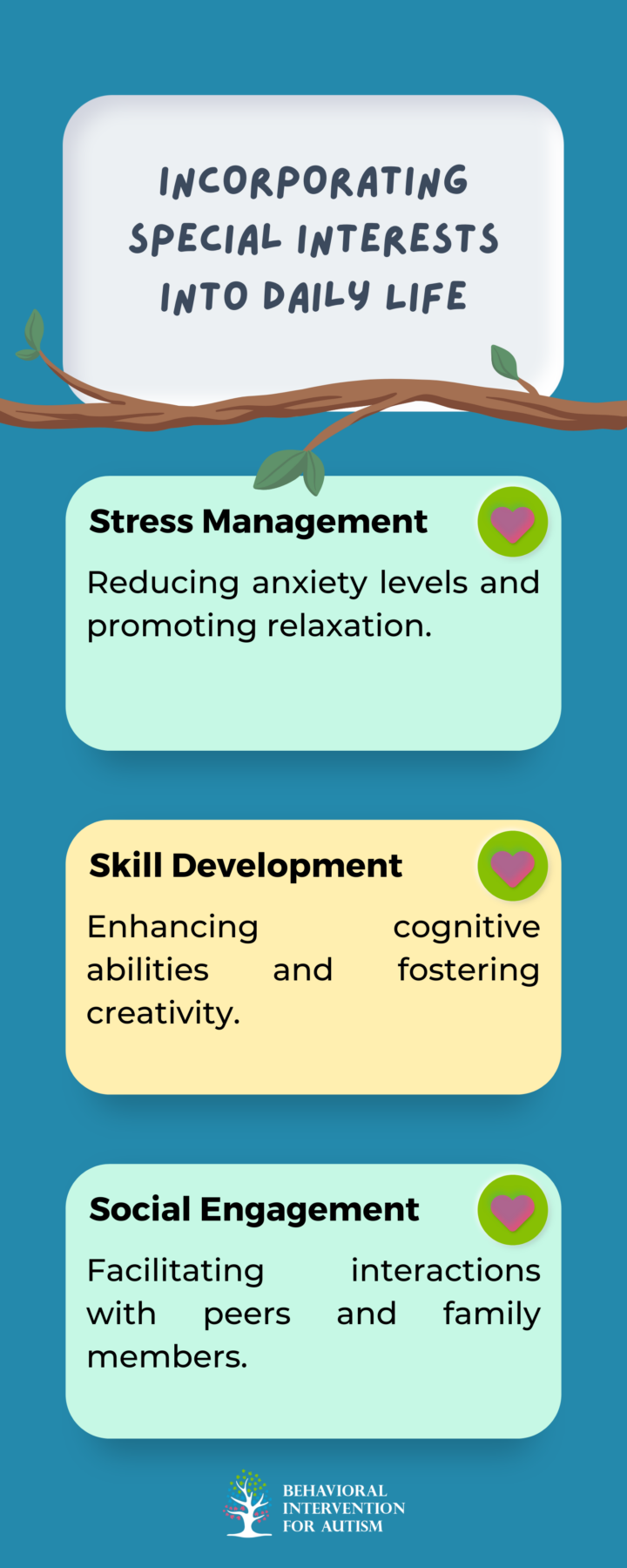
Table of Contents
Special interests, also referred to as highly restricted, fixated interests that are abnormal in intensity or focus, are prevalent in individuals with autism. While not explicitly outlined in widely-used diagnostic manuals like DSM-5, special interests play a significant role in the lives of autistic individuals.
Are Special Interests Only for Autism?
No, special interests are not exclusive to autism. While individuals on the autism spectrum often exhibit intense focus and passion for specific topics, interests are a universal human experience. Many people, regardless of neurodiversity, develop deep interests or hobbies that can consume their time and energy. These passions can range from music and art to science and sports, and they serve as a source of joy, fulfillment, and personal identity for many. Engaging deeply in these interests can promote skills development and enhance social connections with others who share similar passions.
That said, the nature of special interests may differ among individuals with autism. For some, these interests may be more pronounced and serve as a vital coping mechanism or a way to connect with the world around them. Understanding this nuance is essential for fostering inclusivity and appreciation for diverse experiences. In essence, while special interests can be a hallmark of autism, they are not limited to it and can be found across the neurodiversity spectrum.

Definition of Special Interests
Special interests in autism manifest as intensely focused areas of fascination that captivate individuals on the spectrum. These interests may revolve around specific topics, activities, or objects and can vary widely in their nature and intensity. While special interests are not inherently negative, they can become consuming and all-encompassing for some individuals, impacting their daily functioning.
Importance of Special Interests
Special interests hold immense importance for most autistic individuals, serving as essential components of their mental and emotional well-being. Research and personal accounts indicate that engaging with special interests can provide comfort, aid in coping with changes, support emotional regulation, and enhance skill development.
It is crucial for caregivers and loved ones of individuals with autism to recognize the significance of special interests in their lives. By embracing and incorporating these interests into daily routines, educational activities, and skill-building endeavors, caregivers can foster a supportive environment that encourages growth and self-expression.
The prevalence of special interests in autism is noteworthy, with research suggesting that between 75 to 95 percent of individuals on the spectrum exhibit some form of specialized focus. Acknowledging and accommodating these interests not only facilitates individual well-being but also promotes self-expression and autonomy in individuals with autism.
Impact of Special Interests on Individuals
The impact of special interests on individuals, particularly those with autism, goes beyond simple hobbies or preferences. Special interests play a significant role in emotional well-being, developmental benefits, and coping mechanisms for many individuals.
Emotional Well-being
For many individuals, including those with autism, special interests are vital for their emotional well-being. These interests can provide a sense of comfort, security, and familiarity in a world that may feel overwhelming at times. Studies show that autistic individuals often feel enriched by their special interests rather than controlled by them.
Engaging with their special interests can bring joy, reduce anxiety, and offer a way to decompress from stress or sensory overload. Many individuals report feeling a deep sense of satisfaction and happiness when they are able to immerse themselves in their passions.
Developmental Benefits
Special interests can also offer significant developmental benefits for individuals with autism. By indulging in their interests, individuals can boost their self-esteem, confidence, and sense of identity. These interests can provide a sense of purpose and accomplishment, fostering a positive self-image and promoting personal growth.
Moreover, special interests can act as a catalyst for learning and skill development. Individuals may inadvertently acquire new knowledge, hone specific skills related to their interests, and enhance their problem-solving abilities.
Coping Mechanisms
Special interests serve as powerful coping mechanisms for individuals with autism, helping them navigate the complexities of daily life. These interests can serve as a source of predictability and routine, offering a sense of control in an often unpredictable environment.
Engaging with special interests during changes or challenges offers a sense of stability and reassurance. This coping mechanism helps individuals regulate emotions, manage stress, and navigate social interactions more effectively.

Managing Special Interests
Special interests, a prevalent aspect of autism, should be acknowledged and supported by caregivers and loved ones as they significantly contribute to the overall well-being and growth of individuals with autism. It is essential to recognize the distinction between behaviors associated with special interests that are beneficial and those that may be harmful to the individual’s mental and physical health.
Differentiating Harmful vs. Beneficial Behaviors
Special interests are generally enriching for autistic individuals, providing a sense of focus, comfort, and fulfillment. However, in some cases, these interests can turn problematic if they lead to harmful behaviors, pose risks to oneself or others, or interfere with daily functioning. Before intervening, it is crucial to determine whether the behaviors stem directly from the special interest itself or are influenced by other factors such as executive dysfunction or co-occurring conditions.
Aspect | Harmful Behaviors | Beneficial Behaviors |
Impact on Mental Health | Obsessive behaviors, isolation | Improved focus, sense of accomplishment |
Impact on Daily Functioning | Disruption of routine, withdrawal | Increased engagement, skill development |
Effects on Relationships | Conflict, aggression | Positive social interactions, shared interests |
Studies have shown that autistic individuals perceive their special interests as sources of personal enrichment rather than elements of control. Educators and clinicians are now leveraging special interests as valuable tools for enhancing engagement and learning outcomes while actively addressing any problematic behaviors associated with these interests.
Incorporating Special Interests Into Daily Life
Special interests, routines, or rituals serve as vital coping mechanisms for individuals with autism, offering them a sense of predictability, structure, and control in their daily lives. By incorporating these interests into daily routines, caregivers can help autistic individuals manage stress, anxiety, and sensory sensitivities more effectively.

Special interests, routines, or rituals can become disruptive or negatively affect individuals and their families. Exploring alternative behaviors and strategies is essential in these cases.
Educators and clinicians are increasingly incorporating special interests into educational settings and therapeutic approaches to harness their potential benefits while addressing any challenges that may arise from these interests.
Professional Guidance for Challenging Situations
Navigating challenging situations related to special interests in individuals with autism requires a thoughtful and informed approach. Addressing problematic special interests and knowing when to seek professional support are vital for the well-being and development of autistic individuals.
Addressing Problematic Special Interests
While special interests are generally beneficial and enriching for individuals with autism, there are instances where these interests can become problematic. It is crucial to differentiate between behaviors that stem directly from the special interest itself and those influenced by other factors such as executive dysfunction or co-occurring disorders.
Identifying problematic behaviors associated with special interests is the first step in addressing them. Behaviors that pose risks to mental or physical well-being, promote harm against oneself or others, or disrupt daily functioning may require intervention. Understanding the underlying motivations behind these behaviors can help caregivers develop appropriate strategies for managing and redirecting them in a positive direction.

Seeking Professional Support If Needed
Facing challenging behaviors related to special interests often requires professional support. Educators, therapists, and clinicians specializing in autism can offer valuable insights and guidance for effectively addressing these issues.
Professional support can help caregivers and individuals with autism develop tailored strategies to manage challenging behaviors and promote positive coping mechanisms. This may involve behavior therapy, cognitive-behavioral interventions, or individualized treatment plans that address the unique needs of the individual.
Additionally, professionals can offer advice on how to incorporate special interests into daily routines in a constructive and beneficial manner. By working closely with experts in the field of autism, caregivers can gain the knowledge and tools needed to support autistic individuals in navigating complex issues related to their special interests.
Special interests can be a fascinating aspect of autism, providing individuals with a deep focus and passion for specific topics or activities. While they are often associated with autism, these interests can be found in people across various neurodiverse backgrounds. Embracing these passions can enhance social interactions and create opportunities for meaningful connections.
Behavioral Intervention for Autism is here to help individuals navigate their unique interests through tailored strategies and support. Our commitment to providing exceptional ABA therapy in Florida ensures that each person receives personalized care that respects their interests while fostering growth and development. If you’re curious about how our services can benefit you or your loved one, reach out to us today to learn more!
- 9 Common Obsessions of Children With Autism You Should Know - February 25, 2025
- What is Neurodiversity? A Guide to Embracing Differences - February 25, 2025
- Understanding Hyperfocus in Autism: What It Means and Why It Happens - February 25, 2025
